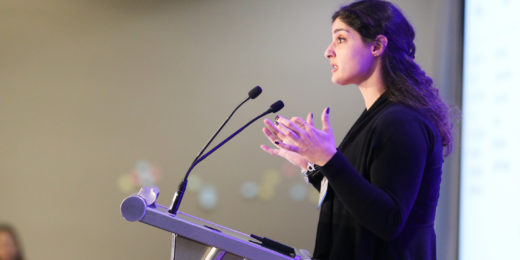Over the past several years, an increasing number of women have decided to freeze their eggs to buy themselves more time to get pregnant later in life. In 2009, only 475 women froze their eggs, according to the Society for Assisted Reproductive Technology. By 2017, that number was 10,936.
For women in demanding careers, the opportunity to freeze one's eggs can be life-changing. Ioana Baiu, MD, a cardiothoracic surgery fellow at Stanford Medicine who decided to freeze her eggs, has experienced this firsthand. Baiu knew her path to becoming a surgeon would be long and strenuous, and freezing her eggs was a logical way to focus on her career while leaving open the possibility of having children in the future.
However, it's not as easy as it may sound, and it's not exactly a topic for open conversation, even for women working in medicine. Consequently, many of them may never consider the option, which they might regret later, Baiu said.
I spoke with Baiu about her experience and her hope that sharing her story will break down the stigmas and social barriers surrounding egg freezing and demystify this process for women working in medical fields.
Why did you decide to freeze your eggs?
Medical training is extremely long, I think longer than most people realize. You do the four years of medical school, sometimes that can be six if you're pursuing a PhD or master's degree. After that, your residency training is anywhere from three to 10 years. So, by the time you're in a situation where you are financially stable, have a little bit more agency over your schedule and are ready to settle down, you're in your mid-30s, sometimes older.
Because of biology's natural clock, it's just harder and harder to start a family at that point. I've known people who finished the training just to find out they could no longer get pregnant.
I wanted to preserve my option to have children, so I froze my eggs.
What goes into freezing one's eggs?
You meet with a fertility doctor and get baseline lab work done to ensure you're in good health. Typically, the doctor will do an ultrasound to look at your ovaries, then predict how successful the process of harvesting eggs might be.
After that, you get list of prescriptions to stimulate the ovaries and ripen multiple follicles. I'm a surgeon -- I'm used to working with syringes and needles and mixing medications -- but even I was overwhelmed by the pile of medications and different needles strewn across my dining room when I spread them all out.
For the next two weeks, your life is very tightly controlled. Your medications and injections have to be given at a certain time, and there are all these little obstacles that don't initially occur to you. There was one time when I was in surgery and I had to tell the attendings I was working with -- and typically they are male surgeons because surgery is moreover a male-dominated field -- that I had to scrub out for five minutes and give myself a shot.
After two weeks of the hormone treatment and ultrasounds, the doctor administers a final shot, which helps the eggs mature and releases them from the follicle so they can be retrieved. This shot is done 36 hours before the retrieval. During this, the doctor uses a needle guided by a transvaginal ultrasound to recover the eggs and you are under conscious sedation.
What are some of the biggest obstacles people face when freezing their eggs?
The main obstacle is how expensive it is. Most medical trainees don't have insurance that covers or subsidizes the procedure. To see it through financially, most people have to take out a loan or tap into their savings. One egg-freezing cycle -- initial tests, injections and retrieval -- costs $6,000 to $10,000. Afterwards, you need to pay hundreds each year to store your eggs.
And sometimes, one round of treatment isn't enough; most women who do it end up going through a couple rounds. I did one treatment while I was on a very difficult rotation. I wasn't sleeping much, and I was on call 24/7. That treatment didn't go very well and I had a minimum egg yield, so I waited six months and did a second round while I was on an easier rotation. That one was very successful and I didn't think I needed a third round.
Have you noticed a stigma against women freezing their eggs?
Freezing your eggs has less of a taboo these days, but that wasn't the case 10 years ago. I happen to be part of a surgical program at Stanford, which is more progressive, and women are very well represented, so more people are open to talking about this and supporting others who are going through the process.
But it's still an uphill battle in many ways. There's this idea that women shouldn't draw attention to the fact that they are women in medicine, and that they have different needs than men do. You want to be treated equally and be seen as an equal, and you don't want your personal needs to undermine how your work is evaluated. So, instead of celebrating that they are woman, some women try to downplay that just so they can are accepted and fit in.
How did you navigate sharing such a personal decision at work?
When I was going through the process, I was a chief resident and leading a team. When I told my junior residents about it, many of them said they had either gone through the process and hadn't told anyone, or didn't know anything about it and were really interested. People would refer friends to me; every few weeks somebody would say, "Can you talk to this person? They're interested in freezing their eggs."
A lot of people were taken by surprise when I shared my story. They said, "I am so happy that somebody is talking about this." That opens doors for some people who otherwise wouldn't have thought about it or thought it was possible.
Photo by Jezabel






